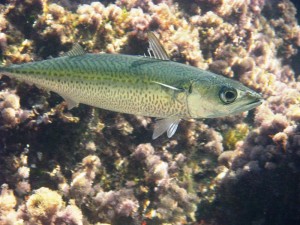Scoping Reveals Emerging Forage Fisheries
This post is the first in a new series called “Focus on Forage Fish.” For the next month, many of our blog posts will highlight the importance of managing prey species for the needs of marine ecosystems.
At the October 7th meeting of the Mid-Atlantic Fishery Management Council, we heard disturbing word from the region’s fishermen that a handful of unmanaged forage species are already the target of commercial fisheries, including round herring, Spanish sardine and chub mackerel, making real the threat of growing fishing pressure on the east coast’s unprotected forage base.

U.S. landings of chub mackerel, an unmanaged forage fish in the Mid-Atlantic, jumped from 63,000 pounds in 2012 to over 4.3 million pounds in 2013.
Fortunately the Council, after reviewing testimony from 180 individuals and a dozen organizations on protecting unregulated prey species, responded by initiating an amendment incorporating these fish into its fishery management plans (FMPs) as ecosystem component species. The “ecosystem component” tag recognizes the importance of prey species to managed fisheries and enables the Council to fast-track protective measures.
I testified for Wild Oceans at the Philadelphia meeting, after submitting written comments beforehand, warning the Council that “(i)n light of escalating demand for forage fish products, prohibiting the expansion or development of fisheries for unmanaged species, until adequate science is available to assess and avoid negative impacts, is an essential precautionary step” in conserving the region’s overall forage base. We recommended the Council follow the Pacific Council’s approach to its recently completed unmanaged forage initiative, by identifying forage fish to be listed as ecosystem component species, and by amending all relevant FMPs to recognize food web connections to council-managed predators.
Although the Council did agree on how to protect unmanaged forage, it did not decide which species will get protection. A technical team of experts from Council staff and the National Marine Fisheries Service is charged with refining a species list and developing a suite of options to prohibit the development of new, and expansion of existing, directed fisheries in Mid-Atlantic federal waters.
The need to protect all components of the forage base was underscored by news about fisheries the Council has no handle on. It seems that because of the low availability of Atlantic mackerel in recent years, some fishermen are pursuing chub mackerel, a prey species important to swordfish, tuna, mahi-mahi and sharks. Landings escalated in 2013 to over 4.3 million pounds from just over 63,000 pounds in 2012.
Wild Oceans commends the Mid-Atlantic Council for its commitment to advance ecosystem-based approaches to fisheries management and for recognizing the importance of forage fish conservation in meeting healthy ecosystem goals. Pressure on forage fish populations will continue to increase with escalating demand for products such as fishmeal and fish oil, and it is important for the Council to take action now to get ahead of the curve.
This article is also published at WildOceans.org.



Pingback: Focus on Forage Fish | Marine Fish Conservation Network